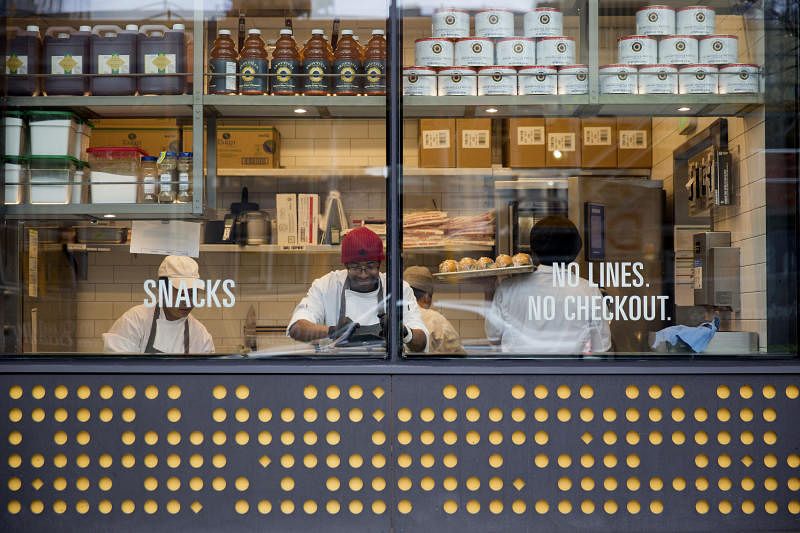I beeped Benjamin through the gates, linking his purchases to my account, then scanned once more to follow.
Inside, the market felt surprisingly spare, an upscale but monochromatic convenience store with a camera-jammed ceiling. There was no produce department, beyond some pre-cut packaged fruit. No meat counter. It was like the inverse of a Costco warehouse, every item designed for a household of one or two, from single-serving boxed Duncan Hines mug cake mix to shelves of Amazon-branded meal kits. The selection was squarely aimed at urban workers in the South Lake Union neighborhood, once jokingly and now seriously referred to as Amazonia, who are notorious for prizing speed and ease when they emerge for snacks and meals.
A wall of candy featured an "Amazon Go" bar from Theo Chocolate, Seattle's fair-trade chocolate factory. Boxed pastries came from Seattle's Macrina Bakery and the Essential Baking Company, mainstays at indie cafes. If 69-US-cent (S$0.91) Diet Cokes did not appeal, there was pressed-rhubarb soda from Great Britain and US$3.99 Stumptown cold brew from Portland. ("That's the most expensive coffee ever," sputtered Benjamin, who tries to be frugal with his hard-earned babysitting cash. I had to break the news that it was not.) Packaged salads and prepared foods lined the refrigerated shelves, from butter chicken to tofu banh mi. Several items were sold out, including birthday-cake-flavour Halo Top ice cream.
Customers may have come for the novelty, but they left with full bags. So did we: Benjamin chose pasta salad (US$4.99) and iced tea (US$1.39). I added a chocolate chip Macrina cookie (US$2.29), a box of Honey Nut Cheerios (US$2.99) and a two-serving salmon donburi meal kit (US$19.99.) The kit made a good dinner, as I'd expect - Amazon long ago hired Jonathan Hunt, formerly one of the city's top caterers. We walked out without incident. Five minutes later, my phone chirped with an itemised receipt, complete with product photos and a time stamp noting our 23-minute and 54-second visit.
"I think this could be a big thing," Benjamin said.

That's been the case with everything else involving Amazon and Seattle, where the home-grown giant has fuelled explosive growth, for better or worse.
Look one way outside Amazon Go to see the spectacular new Amazon Spheres, private dome-shaped office buildings landscaped with tropical gardens. Look the other way towards the Mary's Place shelter for homeless families that Amazon sponsors in another building, one of the few bright spots in a raging homelessness crisis. Seattle's median home price is now US$725,000, unattainable even if the non-existent cashiers at Amazon Go had earned the city's US$15 minimum wage.
 Sandwiches for sale. PHOTO: AGENCE FRANCE-PRESSE
Sandwiches for sale. PHOTO: AGENCE FRANCE-PRESSE Would he miss human checkers?
He'd miss humans at restaurants if tablets replaced servers, he said. He wants human bookstore clerks who know and love books. But grocery-store pleasantries seemed shallow and transactional, and not essential.
To my generational surprise, I agreed. Maybe it's from all the non-Amazon markets that already replaced many humans with self-check kiosks where I scan my own bar codes in incompetent solitude.

The Big Brother aspect of our shopping trip, though, still bothered me. I told Benjamin how I paid cash for prenatal vitamins when I was pregnant with him, to preserve our privacy. In 2001, that felt paranoid. Now it seems prescient - and, to his generation, pointless.
"Amazon could get that information anyway, without the store," he said.
We headed home and Benjamin's siblings eagerly pounced to see what he was carrying and where he had been.
"It's a new grocery store. It's run by Amazon," he told 10-year-old Nathaniel.
"It's run by robots?" Nathaniel said.
Benjamin explained the scenario. Nathaniel seemed more impressed than concerned.
"Robots have taken over the Earth," he said.
"Kind of," replied the most benevolent big brother he will ever have.
Benjamin took his pasta salad and iced tea out of the bag, and took them to his room - to have some privacy while he ate.

